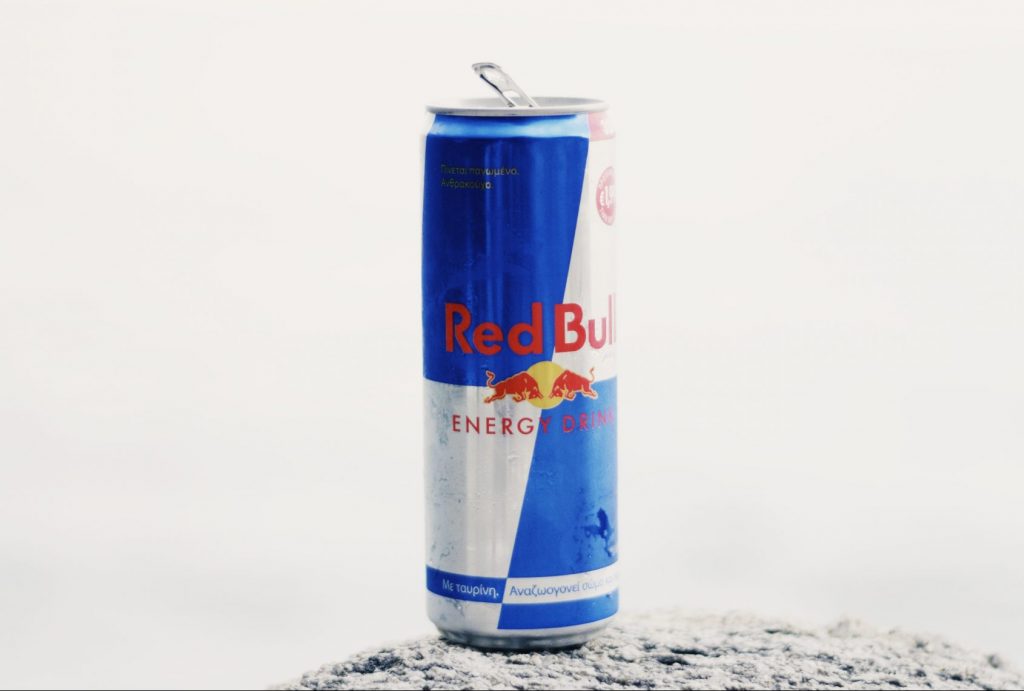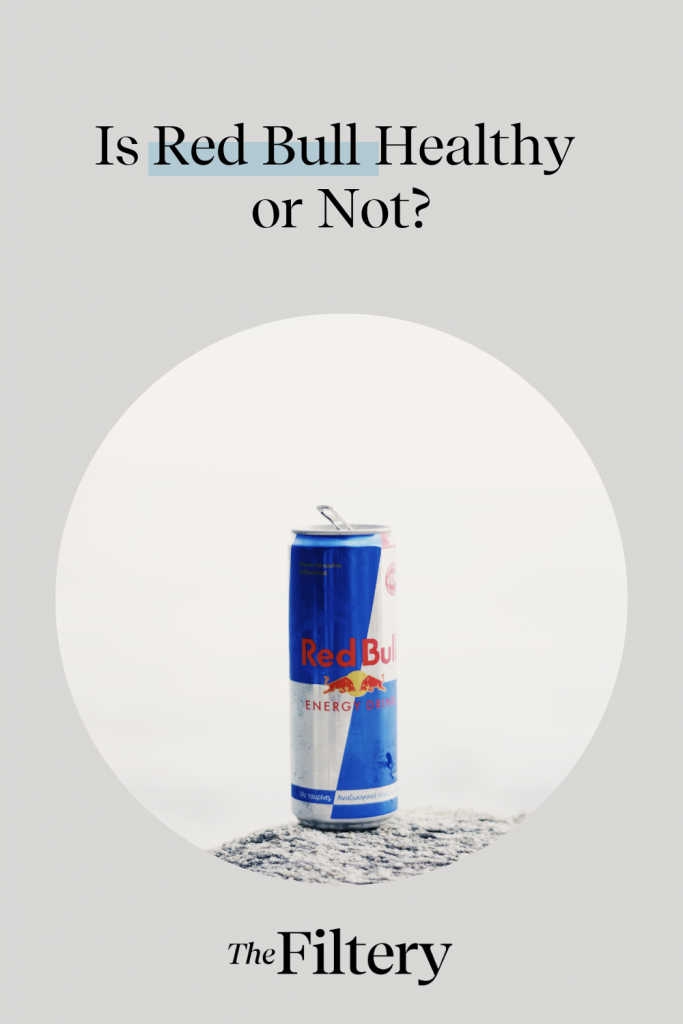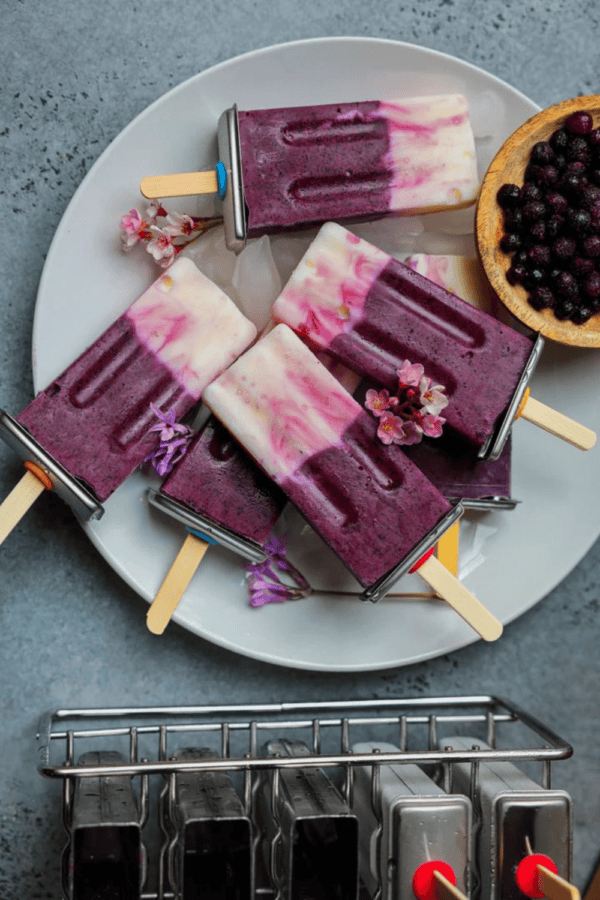It seems most people could use some extra energy these days. Whether it’s the single mom balancing two jobs, the student prepping for finals while working to pay for graduate school, the server juggling ten tables, or the small business owner working overtime, most people could use a little help staying energized!
Sometimes, however, that quick fix can have long-term consequences to one’s health. Red Bull is a favorite choice of many people for a sudden jolt of energy when studying, working, or even socializing with friends, but do we understand what that choice is doing to our bodies?
We will dig in and take a closer look at what’s in Red Bull and how its ingredients can affect our overall health. If you drink Red Bull regularly, you’ll probably want to keep reading.
Table of Contents
- What Is Red Bull?
- What Are Energy Drinks?
- What Do Energy Drinks Do For You?
- What Does Red Bull Taste Like?
- Is Red Bull Made Out of Bull Sperm or Bull Urine?
- So, What Is Taurine? And what Is Aminosulfonic Acid?
- Then Why Is the Red Bull Logo a Bull?
- Let’s Talk Ingredients: What is in Red Bull?
- Red Bull and High Levels of Taurine
- Ginseng, Gingko Biloba, and Guarana
- B Vitamins in Red Bull: More Than You Need?
- How Bad is the Caffeine Content in Red Bull?
- Sugar and Sugar Substitutes in Red Bull
- Other Ingredients in Red Bull
- Are There Side Effects To Drinking Red Bull?
- Kidney Damage
- Risk of Diabetes
- Blood Sugar Problems
- Increased Blood Pressure and Heart Rate
- Damaged Teeth
- Is Red Bull Life-Threatening If You Drink Too Much?
- Mixing Red Bull and Alcohol: Same Effect as Cocaine…?
- Red Bull is Known to Increase High-Risk Behavior
- Why is Red Bull Bad for Kids?
- Red Bull: Is It Healthy or Not?
- Is the Sugar-Free Version of Red Bull Healthier?
- Addiction and Long-Term Consumption of Red Bull, Oh My!
- Let’s Talk Detox and Red Bull Withdrawal
- Getting to the Root of Caffeine Dependency
- 6 Natural Energy Drinks That Are Better Than Red Bull
This post contains affiliate links, which means we may earn a small commission if you choose to make a purchase. We only make recommendations that are genuine and meet our ingredient/material safety standards.
What Is Red Bull?
Even though humans have been drinking coffee for more than 500 years, at some point, a cup of joe was no longer enough for many people. So, manufacturers of energy drinks brought us a wide array of choices that provided an alternative to traditional java. Red Bull is one of the most recognizable energy drink brands, making its debut in 1987 and now reaching billions each year.
By combining sugar, caffeine, taurine, and vitamins, Red Bull provides a much-needed jolt when you feel fatigued. But energy drinks are also associated with some dangerous side effects, so that that jolt may come with some risks.

What Are Energy Drinks?
Energy drinks are formulated to boost energy for periods when you’re fatigued and are designed to increase mental alertness. This is why you will often see them used by people who need to study or concentrate on another type of task for an extended period of time.
Energy drinks come in different sizes and flavors. Sometimes you will see them sold in sizes similar to other beverages, such as a 16-ounce bottle, while they’re also often packaged in smaller, more concentrated sizes, such as a two-ounce energy “shot” drink.
The caffeine content in some energy drinks can be in excess of 200 milligrams—twice as much as an average cup of coffee.
What Do Energy Drinks Do For You?
Individuals may respond differently to stimulants like caffeine, so not every person will have the same results. Some are extremely sensitive to caffeine, while others can handle drinking coffee and energy drinks all day long and be relatively unaffected. (This is why it’s important to listen to your body and figure out what’s best for you!)
In general, though, the initial effects from an energy drink will include:
- increased energy
- increased mental alertness
- increased reaction time
Unfortunately, an energy drink can also cause unfortunate and unpleasant side effects, which we will cover a little later on.
Body
Is Microwave Popcorn Healthy or Bad for You?
It turns out, most microwave popcorn comes with chemicals that are known to cause long-term health problems in humans. Learn about what those chemicals are, and which are the healthiest popcorn brands.
What Does Red Bull Taste Like?
Imagine trying to describe the taste of licorice: it is distinct and memorable, and once you’ve had it, you always know what it tastes like. The same is true of the original Red Bull. It has a distinct flavor that some people love while others just tolerate. Some describe it as being similar to cough syrup.
Over the years, Red Bull has added new flavors like blueberry and kiwi to try to appeal to those who don’t like the original taste.
Is Red Bull Made Out of Bull Sperm or Bull Urine?
While it may seem silly to even ask, this is a rumor that has circulated for years. The rumor is wrapped up in misunderstandings of “taurine,” but consumers of Red Bull can rest assured they are not ingesting bull sperm or bull urine!

So, What Is Taurine? And what Is Aminosulfonic Acid?
Taurine is at the center of these Red Bull rumors: it is an amino sulfonic acid that occurs naturally in meat, fish, dairy items, and human breast milk, but is produced synthetically for Red Bull. Because taurine was originally isolated from bull semen, this led to the circulation of rumors about Red Bull ingredients.
Taurine is thought to improve athletic performance and even help when there is congestive heart failure, but the studies are few, and the evidence, thus far, remains minimal.
According to the Mayo Clinic, we need more information to understand the effects we could experience with the long-term use of taurine.
Then Why Is the Red Bull Logo a Bull?
Those who perpetuate the “bull semen” rumor point to the logo as a sort of flimsy piece of proof that this “ingredient” is indeed present in the popular energy drink. But those animals pictured on the cans are not actually cattle. The Red Bull logo features guars, which are the largest members of the bovine family.
The two animals “charging” each other stems from the fact that the drink was originally intended for Muay Thai fighters.
Let’s Talk Ingredients: What is in Red Bull?
Red Bull and High Levels of Taurine
A can of Red Bull will have 1,000 milligrams of taurine. While it is not necessarily considered unsafe, as mentioned previously, there is not enough evidence at this point that it is safe in the long term. More studies are needed to understand the effects of this amino sulfonic acid.
Ginseng, Gingko Biloba, and Guarana
These popular herbal supplements are found in some of Red Bull’s competitors, like Monster Energy drinks, but not in Red Bull.
B Vitamins in Red Bull: More Than You Need?
Red Bull is packed with these B vitamins:
- Niacin
- D-Pantothenol (Vitamin B5)
- Pyridoxine HCL (Vitamin B6)
- Vitamin B12
Even though this massive “boost” of B is a selling point for Red Bull, many experts will say it is overkill. If you need to supplement with Vitamin B, there are much healthier ways to do it anyway.
How Bad is the Caffeine Content in Red Bull?
One of the main factors that comes up time and again with the dangers of Red Bull is its caffeine content and how that can potentially affect your body. The caffeine content in an 8.4 oz can of Red Bull is 80 milligrams, which is around the same as a cup of coffee. So when it comes to caffeine, if you can handle a cup of coffee, then Red Bull shouldn’t be a problem for you.
But, if you drink several of them while studying, working, etc., you can certainly end up consuming more caffeine than is safe or recommended. Furthermore, some people who are more sensitive to caffeine may experience things like increased anxiety and fatigue (after the crash, of course) when drinking any amount of caffeine.

Sugar and Sugar Substitutes in Red Bull
It’s hard to read anything about food and beverage products and our health without seeing sugar and (some) sugar substitutes as an enemy. The excess sugar in our diets is the root of a variety of health issues, from diabetes to gut dysbiosis and more.
One 8.4 oz can of original Red Bull contains 27 grams of sugar. This is probably the most problematic ingredient in Red Bull when it comes to potential health issues.
Even though there is a sugar-free Red Bull available, it is sweetened by aspartame, which has been under the microscope in recent years for concerns about its impact on health.
Other Ingredients in Red Bull
Here are some of the other, less-active ingredients in Red Bull:
- Inositol: Found in many foods, like oranges and some nuts, this compound may have a mood-boosting effect.
- Glucuronolactone: This is a naturally occurring carbohydrate that may act as a mild anti-depressant and may help with concentration, focus, and memory.
- Artificial Colors and Flavors: While “artificial” and “natural” flavors can be harmless, they can also be sourced from potentially sketchy sources. The problem is that there is really know way of knowing for sure!
Are There Side Effects To Drinking Red Bull?
You may experience more immediate short-term side effects like increased anxiety from drinking red bull right away, but there are more longterm potential side effects as well, which include (but are not limited to) the following:
Kidney Damage
It is possible that extensive consumption of Red Bull could affect kidney function, and its high sugar content makes it a possible culprit for kidney disease, too.
Risk of Diabetes
The risk of Type-2 diabetes is associated with sugar intake, so a sugary beverage like Red Bull, if consumed regularly, can be a factor in that risk.
Blood Sugar Problems
Drinks like Red Bull have been known to cause glucose and insulin levels to spike. The caffeine in them can also cause a decline in your body’s ability to manage sugar.
Increased Blood Pressure and Heart Rate
Some of the “jitters” we think of with energy drinks like Red Bull stem from the fact that they can cause increased blood pressure and heart rate. Drinking Red Bull in moderation may not cause heart problems for everyone, but those with existing high blood pressure and heart disease should be aware that energy drinks could make their conditions worse.
Damaged Teeth
Acidic beverages like Red Bull can wreak havoc on our teeth, damaging the enamel.

Is Red Bull Life-Threatening If You Drink Too Much?
Red Bull is often used as a drink mixer and combined with alcohol. The combination of the “upper” (caffeine and sugar) with the “downer” (alcohol)” can potentially be very dangerous, especially the more one drinks, if the drinker has a low tolerance, and/or if the drinks are mixed with other substances.
Mixing Red Bull and Alcohol: Same Effect as Cocaine…?
Alcohol alone will slow your nervous system. It works as a depressant. But an energy drink like Red Bull does the opposite, acting as a stimulant. The result is something that’s come to be known as “wide-awake drunk.”
This state is particularly dangerous as there is an incredibly false sense of security: the individual feels “less drunk” than they are, leading to poor and even sometimes fatal decisions.
Because of a similar sensation often associated with the simultaneous use of alcohol and cocaine, Red Bull has been considered by some as having the same effects. To be clear, one cannot call Red Bull and cocaine “equal” in terms of their dangers, but there is indeed enough evidence to support the fact that a “wide-awake drunk” scenario is a dangerous one.
Red Bull is Known to Increase High-Risk Behavior
The comparisons between the combinations of Red Bull + alcohol and cocaine + alcohol are closely associated with what is perceived to be an increased chance of high-risk behavior. When our inhibitions and decision-making abilities are impaired by alcohol, we may make choices that have drastic and long-term negative consequences.
If you take that state and energize it with a jolt from Red Bull, you might call this “foolish choices on steroids.” Red Bull cannot change the fact that alcohol impairs you; however, it can trick you into believing you are not impaired, thanks to the “wide-awake drunk” phenomenon we described earlier.
Because of this, the Red Bull + alcohol combo could potentially lead individuals to make especially dangerous choices, such as driving while intoxicated.
Why is Red Bull Bad for Kids?
While some adults have no serious problems with the consumption of energy drinks in moderation, but children should not drink Red Bull—or other energy drinks—at all.
Insomnia, dehydration, and heart palpitations can all occur when children consume energy drinks, and in some rare cases, we even see seizures and mania. Children’s developing bodies are simply not suited to take on the jolt of a Red Bull. These types of sugary drinks also put them at risk for developing diabetes or obesity, along with a host of other health problems.

Red Bull: Is It Healthy or Not?
While a case can be made that light to moderate consumption of Red Bull does not present significant risks, you would be hard-pressed to make a case to call it “healthy.” If you’re a lover of energy drinks, there are much better options available (which we’ll get to in a moment).
Is the Sugar-Free Version of Red Bull Healthier?
“Sugar-free” is a designation often met with mixed reviews. Cutting down on sugar intake is a healthy way for people to improve overall health, but swapping the “real thing” for a sugar substitute can come with its own bad side effects. The sugar-free version may help you maintain a healthier weight in the short term, but it is not necessarily a “healthy” choice overall.
Addiction and Long-Term Consumption of Red Bull, Oh My!
As chemical addictions go, caffeine may not be as serious as alcohol, cocaine, or other substances, but it can still cause some issues. Red Bull packs a one-two punch when it comes to addictive behavior, with both sugar and caffeine. The rush associated with Red Bull can also remind addicts of the way they felt on certain drugs, so it can be a slippery slope for those who suffer from addiction.

Let’s Talk Detox and Red Bull Withdrawal
For those who maintain a regular Red Bull habit, the detox effects can be harsh. Over a short period of time, after eliminating Red Bull and other energy drinks, you may experience headaches, fatigue, and even depression.
Eliminating Red Bull could make you irritable and anxious, and you may be tempted to drink one to “feel yourself” again. This is a dangerous place to be as it will send you right back to the potential short and long-term side effects associated with Red Bull.
Getting to the Root of Caffeine Dependency
It’s very common for people to need energy drinks and coffee to function in their daily lives. But this long-term dependency on caffeine may be a result of a deeper issue, such a hypothyroid. If you can’t seem to kick (or even just decrease) the habit, you may want to consider working with a doctor or health coach to investigate what could be causing or exacerbating your energy drink habit.
6 Natural Energy Drinks That Are Better Than Red Bull
The good news is that if you’re ready to give up all that sugar and artificial ingredients, there are plenty of energy drinks on the market that have cleaner ingredients and a less jittery form of caffeine. Here are a few of the best natural energy drink alternatives:
MatchaBar

In addition to their matcha powder, MatchaBar also offers a selection of their canned Hustle Energy Drinks, which you can get in Peach, Lemon Lime, Mint, Berry, or Mango. If you want the benefits of matcha (steady energy, antioxidants) but don’t really like the taste of it, these are for you. Hustle seltzer energy drinks are packed with 120 milligrams of caffeine from ceremonial grade matcha, combined with a few other clean ingredients. These are sugar-, gluten-, and GMO-free.
Proper Wild

If you’re looking for an organic alternative to that 5 Hour Energy shot, Proper Wild is a great option. These have twice as much (organic!) caffeine as an average cup of coffee, plus L-Theanine, which will help prevent the jitters and give you stable energy that will last for hours. Proper Wild’s energy shots are completely vegan and free from gluten, dairy, soy, stevia, GMOs, and preservatives. They’re sweetened with natural juices.
Vital Proteins

Vital Proteins has a collection of energizing products, which includes their Energy Collagen Shots—perfect for on the go. These are packed with 7 grams of collagen peptides (which helps with digestion and anti-aging), electrolytes, Alpha GPC, and caffeine sourced from sustainably-sourced coffee fruit extract.
Ora Organic

Ora provides jitter-free pre-workout powder that comes in Raspberry Lemonade, Beet Pomegranate, and Ceremonial Matcha. One serving contains 90 milligrams of caffeine that comes from a blend of organic green coffee beans, matcha green tea, and yerba mate. These are organic, vegan, and free from gluten, dairy, GMOs, and soy.
Magic Mind

A healthier alternative to Red Bull, Magic Mind contains matcha tea (a source of less jittery caffeine) plus adaptogens and nootropics to help you focus and give you long-lasting energy and sharpness. Plus, it’s sweetened with natural honey (only 2 grams of sugar). This drink can not only keep you energized but also boost immunity, decrease inflammation, and help you handle stress.
Laird Superfood

Started by the surfing superstar Laird Hamilton, Laird Superfood carries a whole line of powdered matcha, coffee, and instafuel—just add hot or cold water. This brand is committed to health and sustainability, so all of the ingredients are all-natural and consciously sourced. You can choose from a wide variety of flavors and levels of caffeine and sweetness.
Next time you pick up a Red Bull, you may want to think twice about what you’re about to ingest. Consider how it could potentially affect everything from the enamel on your teeth to the health of your kidney function. If you need a burst of energy to get you through a shift or a study session, try healthier options: check out one of the brands above, take a brisk walk, or drink a big glass of water.
PIN IT:






Image Credits: Jan Kopřiva, Delphine Ducaruge, Mathilde Langevin, Andrea Piacquadio, Justus Menke, Panos Sakalakis, engin akyurt, product photos belong to respective brands





